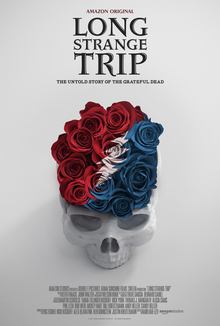I'm not a Deadhead, though I've known a few, and never attended a Grateful Dead show. Heard plenty of stories, though. Watching Long Strange Trip was a window into some of that folk rock and counter-culture history.
The documentary follows the Grateful Dead from their formation in the 1960s all the way through to the 1990s and the death of Jerry Garcia. There's a good amount of background in the early going: hippie culture in California, the musical roots of the band members, and of course a bit of the history of LSD. I learned quite a bit - I had no idea Jerry was a banjo player with several bluegrass bands in the early '60s, for instance. The history is nice for those of us who are too young to remember the '60s and didn't know much about the band members before their famous days.
The documentary doesn't pull punches on the subject of drugs. Acid parties are credited as building a sense of camaraderie, and limiting the clash of egos that is such a struggle for many musicians. There was experimentation with laughing gas in the studio, video crews who learned quickly not to drink anything the band gave them, and even a rivalry between coke-heads and acid-heads on tour. That sort of casual mind-adjustment has never been my taste, but it's interesting to see how the Dead used it to maintain the lifestyle and relationships that they wanted. All of this worked well early on, but eventually people started dying (such as Ron "Pigpen" McKernan from alcoholism, and Brent Mydland from overdose) as the lifestyle took its toll.
Unsurprisingly, none of the band members were particularly business-minded. Their first studio album went way over budget, and one of the interviews talked about how they rarely had any money left after tours since it was spent as quickly as it was made. They talk about the "wall of sound" speaker setup that cost a ridiculous amount to buy and maintain, the chaotic leadership (such as there was any), the lack of planning. It's pretty incredible to me, someone who likes plans and organization, that the whole thing held together...but somehow they made it work through those lean days. And of course, later on the commercial success came almost despite whatever the band did.
That lack of business acumen worked in their favor sometimes, too. Allowing fans to tape the live shows was seen as a terrible business move - who would buy albums if they could get a copy of a live recording? It worked to the band's advantage, though, by expanding the audience who wanted to go to live shows for more of what they'd heard on the tapes. A good number of self-identified Deadheads got their first exposure to the band from those live recordings.
To me, the whole story revolved largely around one theme: the band (especially Jerry) was interested primarily in everyone having fun. Whether that meant using drugs to get in the right mindset, or spending too much money to give fans the best concert experience possible, or having semi-controlled chaos instead of a single leader, or ignoring rules and regulations, or being the face of the Grateful Dead for legions of fans. It seems to me that in the end, Jerry had put others having fun ahead of his own well-being for too long.
Long Strange Trip was a very interesting watch. I'm sure there's plenty more depth to the story of the Grateful Dead, but this sure covered a lot. I'm glad to have had the chance to learn a little more about the band through this documentary.
